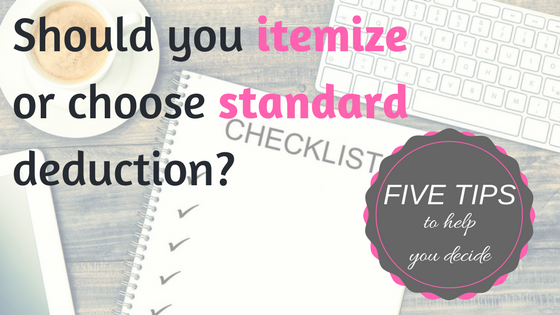Which should you choose – itemized or standard deduction?
Most taxpayers claim the standard deduction when they file their federal tax return. But! You may want to see if you are one of the filers who can lower their tax bill by itemizing. You should definitely look into both ways to see what saves you that dough.
Here are five tips to help you decide:
1. Figure Your Itemized Deductions
Taxpayers need to add up deductible expenses they paid during the year. These may include expenses such as:
- Home mortgage interest
- State and local income taxes or sales taxes (but not both)
- Real estate and personal property taxes
- Gifts to charities
- Casualty or theft losses
- Unreimbursed medical expenses
- Unreimbursed employee business expenses
2. Know The Standard Deduction
If a taxpayer doesn’t itemize, then the basic standard deduction for 2016 depends on their filing status. If the taxpayer is:
- Single – $6,300
- Married Filing Jointly – $12,600
- Head of Household – $9,300
- Married Filing Separately – $6,300
- Qualifying Widow(er) – $12,600
In special cases, such as if a taxpayer is 65 or older or blind, the standard deduction is higher than the previous amounts. The deduction may be limited if the taxpayer can be claimed as a dependent.
3. Check the Exceptions
There are some situations where the law does not allow a person to claim the standard deduction, such as if the taxpayer is married filing a separate return and their spouse itemizes. In this case, the taxpayer’s standard deduction is zero and they should itemize any deductions.
4. Use the IRS ITA Tool
Go to IRS.gov and use the Interactive Tax Assistant tool. It can help determine whether a taxpayer can use the standard deduction. It can also help a filer figure their eligibility for certain itemized deductions. Of course, ask us if you have any questions.
5. File the Right Forms
For a taxpayer to itemize their deductions, they should file Form 1040 and Schedule A Itemized Deductions. Filers can take the standard deduction on Forms 1040, 1040A or 1040EZ.
Whether you are filing standard or itemized, be sure to hang on to your tax forms!

